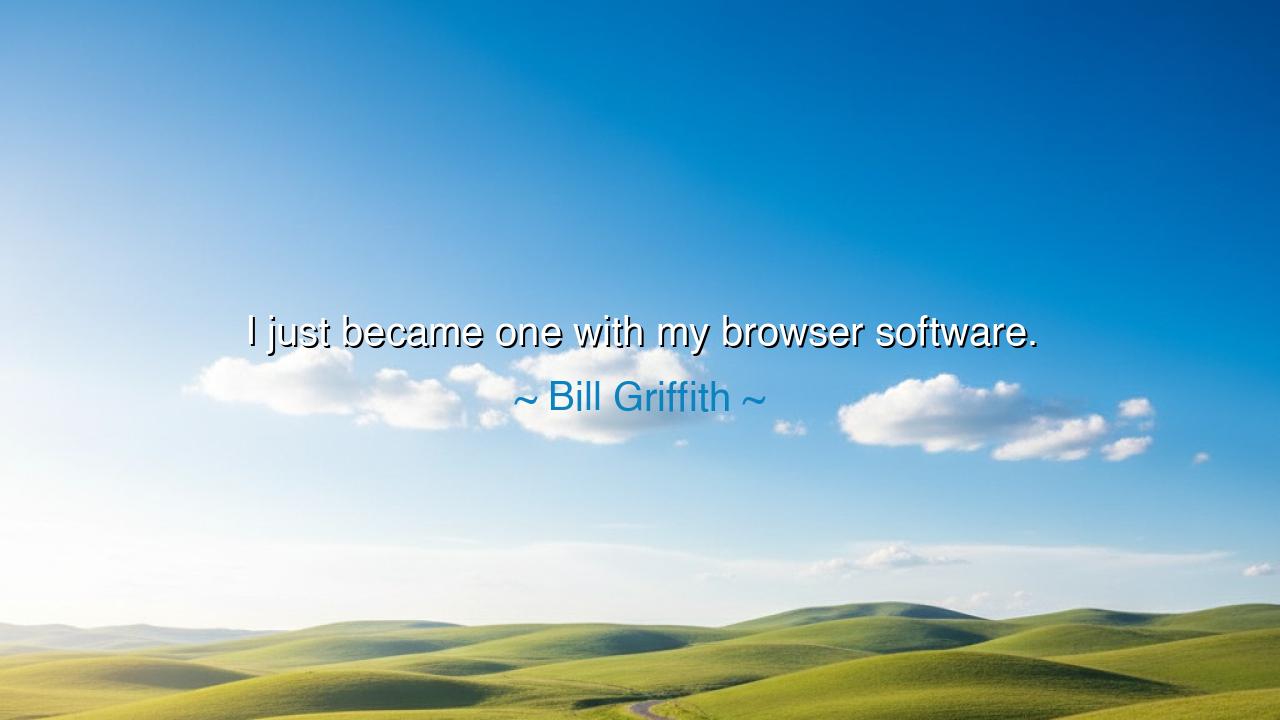
I just became one with my browser software.






In the ancient days, when the sages and philosophers gathered to discuss the nature of existence, they often spoke of unity—the harmonious connection between the self and the world around it. Socrates, with his belief that to know oneself was to truly understand the universe, and Aristotle, with his teachings on the interconnectedness of all things, both understood that the search for meaning lay in integration. To live a life of purpose, they believed, was to live in harmony with the forces of nature, with the thoughts that shaped one’s mind, and with the very act of being. In our own age, Bill Griffith, reflecting on the experience of navigating the modern digital world, speaks to this profound unity in a way that would resonate with the ancients: "I just became one with my browser software."
At first glance, Griffith’s words may seem humorous or lighthearted, but they contain a deep truth about the evolving relationship between humanity and technology. The browser—that humble tool which allows us to navigate the vast ocean of information that is the Internet—has become more than just a tool. It has become an extension of the self. In Griffith’s statement, there is a recognition that technology—specifically browser software—has evolved to such an extent that it has integrated so fully into our daily lives that it can, at times, feel as though we are one with it. Much like the ancient mystics who sought union with the divine or the wise men who strove for alignment with nature, Griffith expresses the modern-day phenomenon of becoming one with a tool that mediates our interaction with the world.
The ancient artisans understood this idea of becoming one with their tools. Daedalus, the legendary craftsman and inventor, was said to have created objects that were so precise, so beautifully designed, that they seemed to transcend the mere material. His creations were extensions of his own mind and will. He did not just use the hammer, the chisel, or the compass—he became them. His hands moved as though they were guided by the very essence of the tools themselves. Similarly, when Griffith speaks of becoming one with the browser, he reflects the same human yearning to merge with the tools we create. The browser, once just a means of accessing information, has become a place where the mind and the digital world intertwine, making the experience of surfing the web feel almost as if we are a part of the network itself.
Consider the story of Marco Polo, the Venetian merchant who traveled across the Silk Road and through lands unknown to the people of his time. His journeys into distant lands, fueled by his curiosity, brought him into contact with cultures, people, and ideas that were vastly different from his own. Yet, through this exchange, Polo became deeply connected to the world in a way that was unprecedented. His stories, written down, served as a bridge between East and West, allowing those who came after him to navigate the world of the unknown. In the modern age, our browser serves a similar purpose—it is the gateway to the unknown, the tool through which we travel vast digital landscapes, learning, exploring, and growing. The Internet, like the Silk Road, connects us to a world of infinite possibilities. And just as Polo became more than a traveler, so too do we become more than mere users of the Internet when we allow it to become an extension of ourselves.
Yet, while becoming one with the browser reflects the deep integration of technology into our lives, there is also a caution to be heeded. The ancients knew that union with anything—whether with nature, the gods, or one’s tools—required a balance. Socrates warned that to know oneself was the highest pursuit, but only if that self was not lost in the distractions of the world. Similarly, in our modern lives, we must be cautious not to lose ourselves in the digital realm, even as we become increasingly integrated with it. The browser is a powerful tool, one that opens the doors to vast stores of knowledge and connection, but it must not be allowed to consume the self. To become too reliant, too immersed, can lead to a loss of the balance that was so highly valued by the ancients.
The lesson here is one of awareness. Griffith’s words highlight the symbiosis between human and machine in the modern world, but they also invite us to reflect on the role of technology in our lives. While it is natural to become immersed in the tools we create, we must remember to maintain a connection to the physical world, to our bodies, and to each other. Technology should serve us, not define us. We must be mindful in our use of it, ensuring that we do not lose touch with the deeper elements of our humanity.
Thus, the practical action is to find balance. As we navigate the ever-expanding digital world, let us remember that we are not merely users of technology, but creators and stewards of it. The browser can open vast worlds, but it should not replace the richness of real life—of nature, of relationships, and of self-reflection. Just as the ancient philosophers strove to find balance between the physical and spiritual realms, so too must we maintain a harmony between our digital lives and our real-world experiences. In doing so, we can truly become one with our tools without losing our way.






AAdministratorAdministrator
Welcome, honored guests. Please leave a comment, we will respond soon